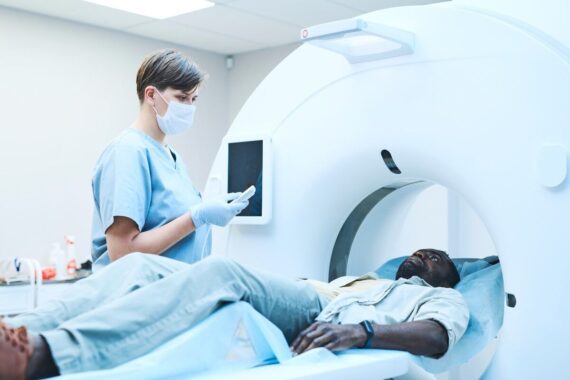The number of cancers diagnoses at stages 1 and 2 in the most deprived areas of England is significantly lower than those caught early in the least deprived areas.
According to NHS Digital, 18,266 (47%) of cancers were diagnosed at stages 1 and 2 in the most deprived areas in 2020: seven percentage points lower than in the most well-off areas.
As many as 25,258 cancers were diagnosed at stages 1 and 2 in the least deprived areas – or 55% of the total stageable diagnoses.
Cancer is one of the five clinical areas of focus set out under the Core20PLUS5, setting out that 75% of cases should be diagnosed at stage 1 or 2 by 2028.
The newly published data – which considers unadjusted percentages – also revealed that early stage diagnoses were significantly lower in deprived areas among at least nine kinds of cancer investigated.
It indicated that 81% of breast cancers in deprived areas were diagnosed at stages 1 and 2, compared to 85% in more well off areas.
This figure stood at 49% to 52% for prostate cancers and 85% to 88% for melanoma of skin cancer.
For larynx cancer, deprived areas saw only 38% of cases diagnosed at stages 1 and 2 compared to 60% in the least deprived areas: the greatest difference identified.
Earlier this year, Cancer Research UK called on the Government to make tackling cancer inequalities central to its 10-year plan after identifying significant disparities in cancer rates by ethnicity.
And in a spring report, the Health and Social Care Committee criticised the Government for its absence of any plan to tackle chronic cancer workforce shortages, which it claimed ‘threaten’ diagnosis, treatment and research.
In November, Pulse reported that the UK National Screening Committee has recommended, for the first time, that all four nations in the UK should implement a national lung cancer screening programme.
A version of this article was first published by Pulse’s sister title Healthcare Leader


















READERS' COMMENTS [4]
Please note, only GPs are permitted to add comments to articles
Too busy trying to keep warm, pay the bills and survive.
Too busy down the pub.
Would be interesting to know if increased diagnostic delay correlates with increased rates of telephone fob-off vs f2f construction.
Laughable piece of work, as my colleagues have said bears, shit & woods need to be correlated in right order.
Maybe NHS Digital findings are a Lazarus moment to those at the coal face NOT
They might want to look at incidence of cancers in these areas.
Lung cancer/breast cancer are probably the two limits.
The stage at presentation is more a function of the disease than the activity of healthcare, or public health.
The diseases in the more deprived areas are not the same as those in non-deprived areas.
These diseases have increased in incidence over the period of austerity.
This has lead to a reduction in the overall life expectancy of everyone.
The choice to favour the abstract ‘economy’ (and failing too) over actual real human beings is what needs changing.